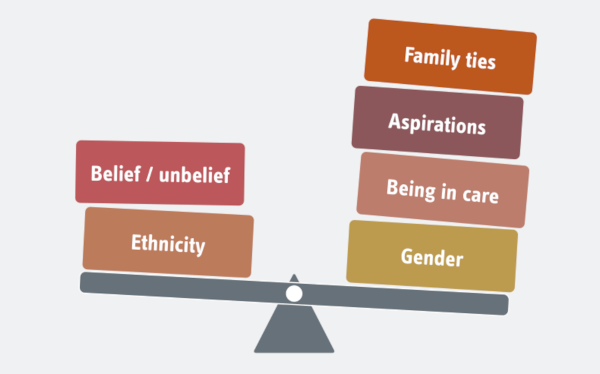Identity can be understood as an individual’s concept of who they are and how they define themselves. New open access Research in Practice resources support identity development with minoritised children and young people.
Researchers at Coventry University, led by Sariya Cheruvallil-Contractor, were commissioned by the Nuffield Foundation to understand the layered identities of minoritised children and young people in care. They worked with Research in Practice to produce resources for child and family social care practitioners, based on findings from their research.
In a new podcast and blog, key messages from the research are explored. The discussion focuses on the dynamic nature of identity and how practitioners can explore what ethnicity and religion means to children and young people. The team will share their findings in upcoming open access workshops.
A new briefing, and the tools contained within it, offer guidance on how social care practitioners can work with minoritised children and young people to explore their identities, meet their identity needs and promote positive identity development. It provides tools to think about and explore identity with children and young people, including:
- the different layers within their identities.
- how they think, feel and relate to different aspects of their inherited identities.
- how they think about their identities within different contexts, and with different people.
By listening and understanding children and young people’s perspectives around ethnicity, religion and identity we can best meet their needs.
This briefing and linked toolkit offers guidance on how social care practitioners can work with minoritised children and young people to explore their identities.
This podcast highlights key messages from recent research exploring the identity needs of minoritised children and young people in care. The discussion focuses on the dynamic nature of identity and how practitioners can explore what ethnicity and religion means to children and young people.
This interactive workshop will explore how care experienced children and young people, particularly from minoritised ethnic and religious backgrounds, experience and express their identities.
Facilitated by a team from Coventry University, the workshop will introduce the findings from their Nuffield Foundation funded research. They will share theory, research and also practical tools to support positive identity development for care experienced children and young people.
This blog outlines the research around a new publication on supporting minoritised children’s identity.
The identity see-saw
The researchers developed the idea of ‘in-flux identity’ as a way of recognising that identities are layered and continually changing. This framework combines Kimberlé Crenshaw's 'Intersectionality' and Meredith McGuire’s 'Lived Religion'.

They created the ‘Identity see-saw’ as way to illustrate how identities change and evolve.
Supporting identity development

Social care practitioners play a significant role in the lives of children and their families. For children and young people, being supported by professionals who recognise their unique and evolving identities is important. These resources support children's identity development.
This briefing aims to support senior managers in meeting the needs of Muslim-heritage children and young people in care. Although it is aimed at senior leaders and managers, the content is of relevance to anyone working with Muslim-heritage children and young people.
This briefing aims to help those reading it build their basic knowledge and understanding, and encourage reflection - supporting them to ask questions of the people, services and organisations they work with. Throughout, there are references and links to resources to support conversations with practitioners, foster carers and others.
This practice tool considers how practitioners can explore and write about identity with children and young people. It gives a short introduction to some useful concepts about identity for social care practitioners and provides guidance about how practitioners could support children’s identity development.

